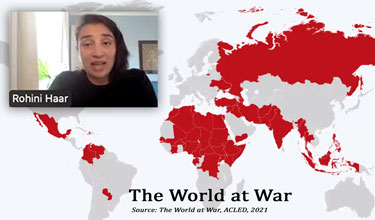The war in Ukraine has received intense global attention, not only for its geo-political and economic impact, but also for its humanitarian abuses. The World Health Organization has verified 64 attacks by Russian troops on Ukrainian hospitals, and millions of Ukrainians have been forced to leave their homes for their own safety.
About 4 million people are estimated to have fled Ukraine since Russia invaded Feb. 24, according to the United Nations. But in a country with a population of 44 million, that leaves many others still at serious risk for harm.
On Wednesday, experts highlighted the devastating public health fallout of the ongoing war, as well the harms of other violent conflicts, during a live webinar.
While the majority of deaths in the unprovoked Russian assault against Ukraine are so far reportedly among members of the military, “in most wars, the vast amount of deaths are among civilians,” said speaker Barry Levy, MD, MPH, an epidemiologist, adjunct professor at Tufts University and former APHA president.
The people in Ukraine are far from alone in the threats they are facing, as one-fourth of people worldwide live in regions “directly affected by armed conflict,” said Levy, who is the author of “From Horror to Hope: Recognizing & Preventing the Health Impacts of War.”
Besides injuries, deaths and displacement, war leads to damage to homes and other infrastructure, environmental contamination, mental and behavioral disorders, malnutrition among infants and children, and interruption of food and water sources, among other harms, Levy said during the event, which was co-hosted by APHA, the National Academy of Medicine and the National Academies of Sciences, Engineering and Medicine’s Committee on Human Rights.
Ongoing conflicts in Myanmar, Yemini and Ethiopia have resulted in massive deaths, destruction and collapse of health care services. Ethiopia, for example, is suffering from the impacts of a civil war in its Tigray region, which has killed over half a million soldiers and civilians, including 19 aid workers and 22 health workers in 2021 alone. Three workers with Doctors Without Borders were slain while rendering aid in Ethiopia in mid-March.
Health care is among the earliest services to collapse during conflict, leading to a breakdown in public health, panelists said during the March 30 event. A rise in infectious disease cases is one common outcome.
During the 2000s, Serbia experienced relative peace and had a strong public health system, recording only 11 measles case that decade, said Rohini Haar, MD, MPH, medical advisor for Physicians for Human Rights. However, between 2015 and mid 2019, when conflict returned to Serbia, scientists estimated over 30,000 cases of suspected measles cases occurred there.
Violence “can break down the entire health system,” Haar said. “All of this in medical terms ultimately leads to what we as doctors fear the most: increased morbidity and mortality."
Public health can be improved through humanitarian assistance, policies protecting human rights and assuring adherence to international humanitarian law, Levy said.
“But the only way to eliminate the health impacts of war is to prevent war,” he said.
The long-term health impacts from war are well known, including physical and mental disabilities. And though nothing can make up for loss of life, some measure of justice can help people in war-torn states come to terms with the trauma, said Chris Beyrer, MD, MPH, director of the Center for Health and Human Rights at Johns Hopkins University.
Social media is revealing the atrocities happening in Ukraine in real-time, Beyrer said. Postings of videos and images are documenting and verifying events that some day might help bring about justice for Ukrainians in an international court.
“We have to have accountability,” Beyrer said. “It really is the only way people can get lasting justice. And justice is a part of reconciliation, justice is a part of nation building and justice is a part of healing.”
To watch a recording of the webinar, “Violent Conflict: The Challenges of Protecting Public Health & Health Care,” visit the NAM website.
Rohini Haar, medical advisor for Physicians for Human Rights, talks about public health in war-torn countries during the webinar. Image by The Nation's Health.